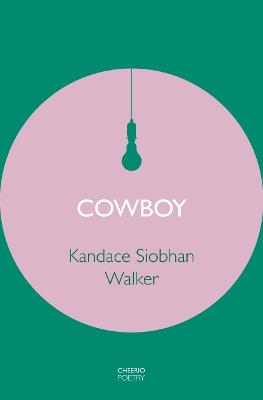Cowboy (FELIX DENNIS PRIZE FOR BEST FIRST COLLECTION, FORWARD PRIZE 2023, SHORTLISTED)
Kandace Siobhan Walker
(Cheerio Poetry, 2023); pbk, £11
Kandace Siobhan Walker is a writer, artist and filmmaker with exceptional creative dexterity. In 2019 Walker won The Guardian’s 4th Estate BAME short story prize. In 2021 she was a recipient of the Eric Gregory Award, winner of The White Review Poet’s Prize, and in 2022, published her debut double pamphlet, Kaleido, in 2022.
Do not be misled by preconceived ideas evoked by the quiet artwork on the cover of this, Walker’s first full collection, Cowboy. Poems shift, build and gather, some driving home their conceit, others ebbing away into the ether. This is not simple in terms of content or of theme either. Walker uses form, white space, and differing orientations, sometimes across two pages… and why wouldn’t she? As the title suggests, we are skilfully herded with no choice but to physically turn the pages, reading from portrait to landscape—orienting and disorienting—to consider themes of gender equality and ethnicity, to self-preservation and neurodiversity misdiagnosed as mental health.
The plight of the misdiagnosed is laid out bare in the titular wordplay of ‘Miss Diagnosis’ who’s ‘[…] self [is] unwelcome within its self — realises the grief/as hyper-experiential as a kaleidoscope. […] like many losers of a race not yet called […]’. We come to appreciate the tedium of living a life ‘[…] medicated and masking […]’.
In ‘Wild Ponies’ imposter syndrome is addressed in the opening line:
Why are everyone else’s poems much more
perfect than mine?
Walker connects directly to the reader with fallibility and humanness, and we smile because we’ve all been there:
I shouldn’t think like this, but I want to do what bugs do
to a Michelin-star soup.
As the poem gathers pace, Walker dresses metaphor in fresh, startling imagery:
God, even wild ponies
in a common field are rockstars to a walker.
Before arriving at the crux of the matter:
One day I’ll accept the poet that I am.
The prose poems placed throughout the collection are almost tangible and seem to act as anchors or containment, perhaps, providing the opportunity for readers to find their bearings.
Riffing off her debut collection, an ever-shifting kaleidoscope opens the door into the sphere of a Millennial, borne into a capitalist world, as uncertain as it has ever been, governed by the shifting esoteric landscape of the information super-highway. Take ‘Neopet’, a prose poem which begins:
— it’s a circle, right? Virtual pet websites are about wealth accumulation. Wealth accumulation is about class. Class is about domination, and domination, of course, is about popular consensus. Popularity is about currency. Currency is points. Points are about commodities. Commodities are weapons and armour and property and paintbrushes[.]
Walker bombards us with a narrative of short snappy sentences loaded with repetition. This is recognisable as our daily experience but with a succinct change in narrative, bringing us back to the cover, to that circle of illumination, encouraging an awakening to the glutinous self-consumption that is our world, as the poem comes full circle, eating itself:
[…] Owners and masters, even when they’re six-year-olds, are about capitalism (and its precedents). And capitalism and its precedents are about wealth accumulation, which brings me back to —
But all is not lost as the prose poems, ‘Cleaning Ladies II’ and ‘Cleaning Ladies I’, consecutively demonstrate in their disorder. As in ‘II’, the collective ‘we’ profess,
Some apocalypses are necessary: […]
And in ‘I’, the final poem, there is kickback against the prospect of ‘Death by protagonism’ as Walker brings it on, and deftly lassoes our subconscious long after we have put the book down.
[…] we scream on the way to work, fuck working! […]
Let us go like a thousand pink party balloons[.]
Whatever happens, happens to you be-
cause of us. We own nothing in the world, just the world.
Wanda McGregor


Leave a Reply